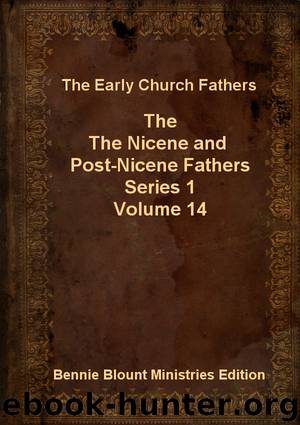Nicene and Post-Nicene Fathers Series 1 Volume 14 by Early Church Fathers

Author:Early Church Fathers [Fathers, Early Church]
Language: eng
Format: epub
Tags: Early Church Fathers
Publisher: Bennie Blount Ministries
Published: 0101-01-01T00:00:00+00:00
Homily LXXIII.
John xiii. 36.-"Simon Peter said unto Him, Lord, whither goest thou? Jesus answered him, Whither I go thou canst not follow Me now, but thou shalt follow Me afterwards."
[1.] A Great thing1 is love, and stronger than fire itself, and it goeth up to the very heaven; there is2 no hindrance which can restrain its tearing3 force. And so the most fervent Peter, when he hears, "Whither I go ye cannot come," what saith he? "Lord, whither goest thou?" and this he said, not so much from wish to learn, as from desire to follow. To say openly, "I go," he dared not yet, but, "Whither goest thou?" Christ answered, not to his words, but to his thoughts. For that this was his wish, is clear from what Christ said, "Whither I go thou canst not follow Me now." Seest thou that he longed for the following Him, and therefore asked the question? And when he heard, "thou shalt follow Me afterwards," not even so did he restrain his longing, and, though he had gainedgood hopes, he is so eager as to say,
Ver. 37. "Why cannot I follow Thee now? I will lay down my life for Thee."
When he had shaken off the dread of being the traitor, and was shown to be one of His own,4 he afterwards asked boldly himself, while the others held their peace. "What sayest thou, Peter? He said, `thou canst not,' and thou sayest, `I can'? Therefore thou shalt know from this temptation that thy love is nothing without the presence of the impulse5 from above." Whence it is clear that in care for him He allowed even that fall. He desired indeed to teach him even by the first words, but when he continued in his vehemence, He did not indeed throw or force him into the denial, but left him alone, that he might learn his own weakness. Christ had said that He must be betrayed; Peter replied, "Be it far from Thee, Lord; this shall not happen unto Thee." (Matt. xvi. 22.) He was rebuked, but not instructed. On the contrary, when Christ desired to wash his feet, he said, "Thou shall never wash my feet."6 (Ver. 8.) Again, when he hears, "Thou canst not follow Me now," he saith, "Though all deny Thee, I will not deny Thee." Since then it was likely that he would be lifted up to folly by his practice of contradiction, Jesus next teacheth him not to oppose Him. This too Luke implies, when he telleth us that Christ said, "And I have prayed for thee, that thy faith fail not" (Luke xxii. 32); that is, "that thou be not finally lost." In every way teaching him humility, and proving that human nature by itself is nothing. But, since great love made him apt for contradiction, He now sobereth him, that he might not in after times be subject to this, when he should have received the stewardship of the world, but remembering what he had suffered, might know himself.
Download
This site does not store any files on its server. We only index and link to content provided by other sites. Please contact the content providers to delete copyright contents if any and email us, we'll remove relevant links or contents immediately.
The Gnostic Gospels by Pagels Elaine(2527)
Jesus by Paul Johnson(2352)
Devil, The by Almond Philip C(2324)
The Nativity by Geza Vermes(2226)
The Psychedelic Gospels: The Secret History of Hallucinogens in Christianity by Jerry B. Brown(2148)
Forensics by Val McDermid(2087)
Going Clear: Scientology, Hollywood, and the Prison of Belief by Lawrence Wright(1974)
Going Clear by Lawrence Wright(1962)
Barking to the Choir by Gregory Boyle(1819)
Old Testament History by John H. Sailhamer(1809)
Augustine: Conversions to Confessions by Robin Lane Fox(1769)
The Early Centuries - Byzantium 01 by John Julius Norwich(1734)
A Prophet with Honor by William C. Martin(1717)
A History of the Franks by Gregory of Tours(1713)
Dark Mysteries of the Vatican by H. Paul Jeffers(1704)
The Bible Doesn't Say That by Dr. Joel M. Hoffman(1676)
by Christianity & Islam(1627)
The First Crusade by Thomas Asbridge(1601)
The Amish by Steven M. Nolt(1562)
